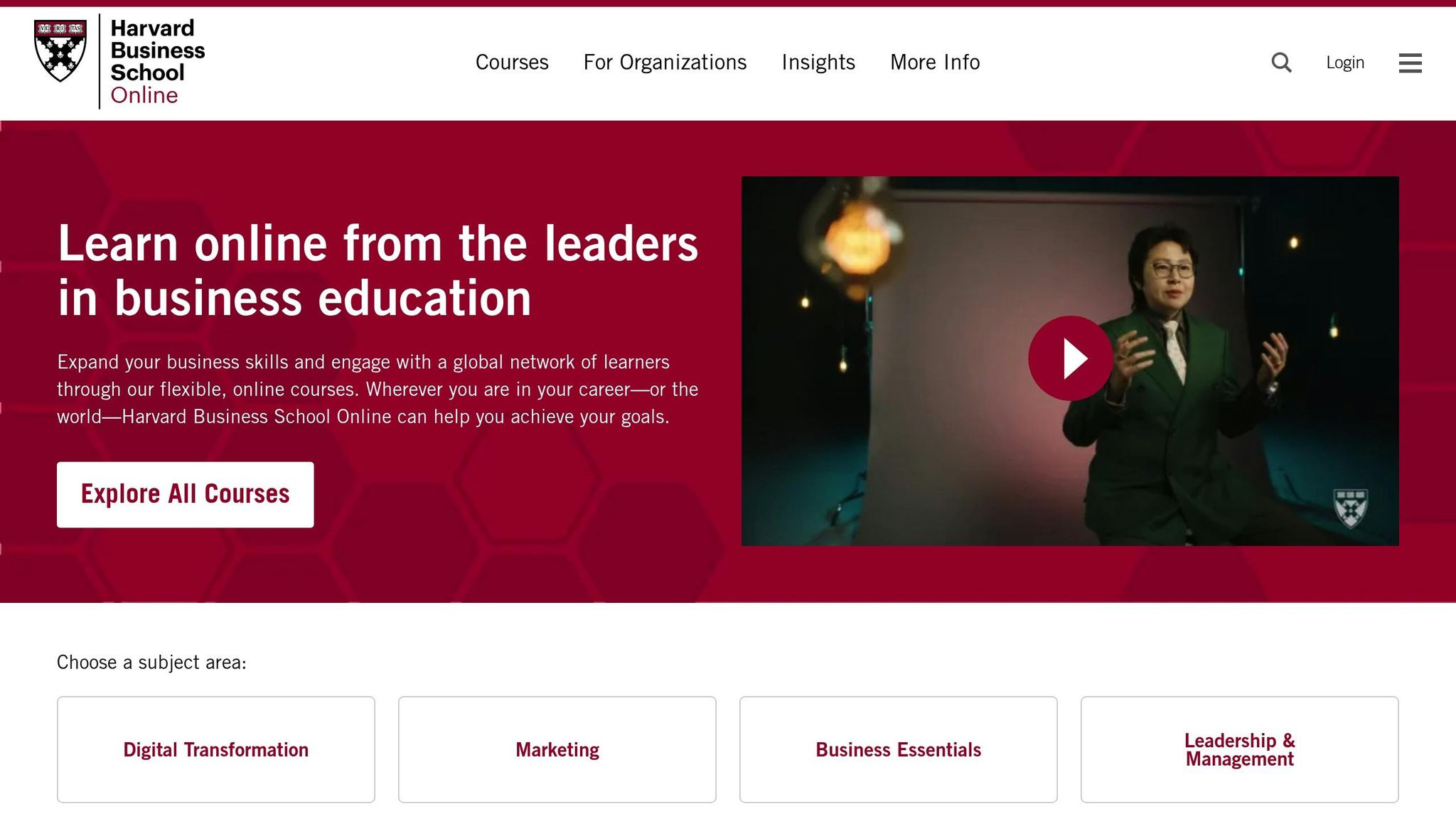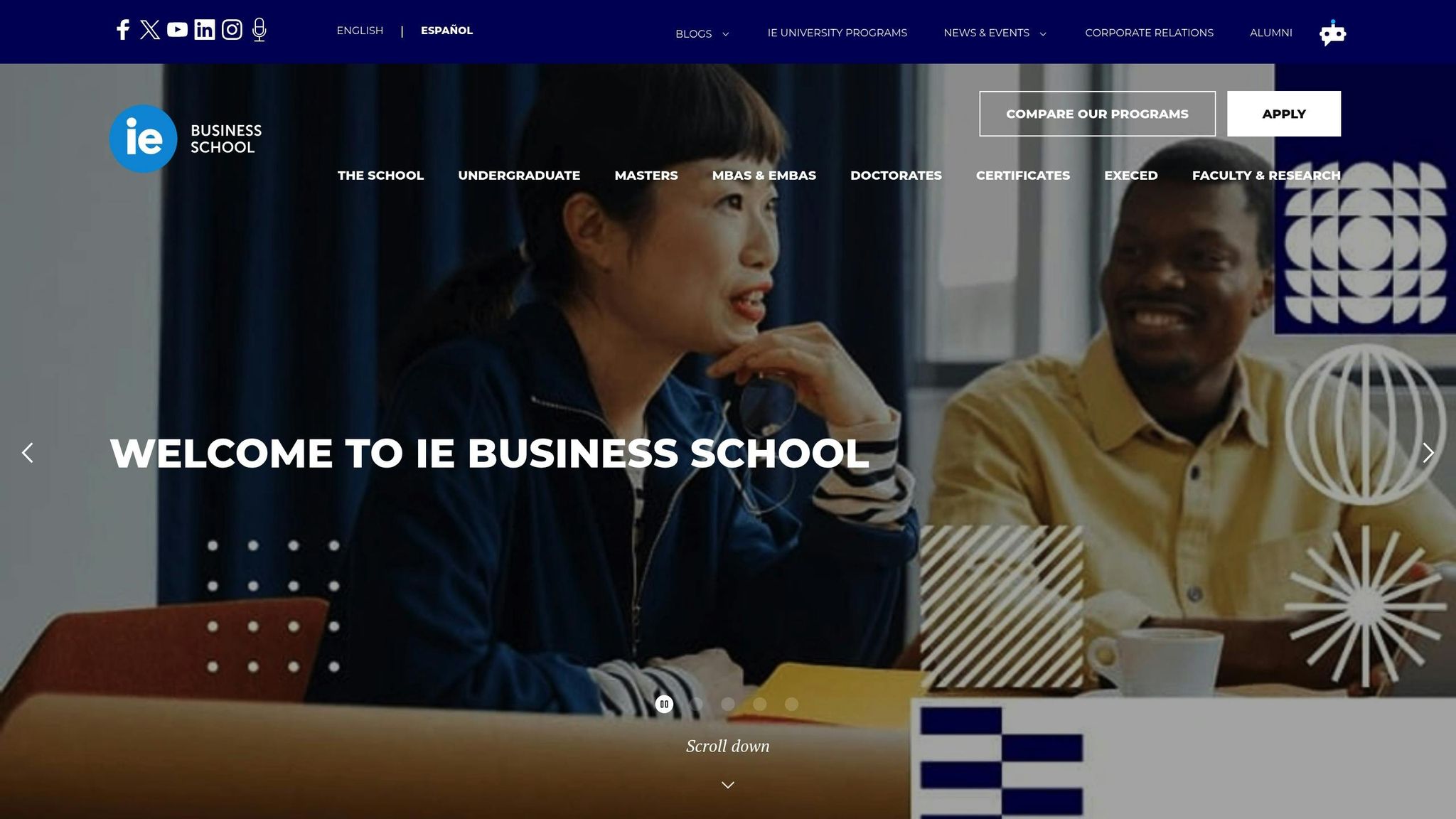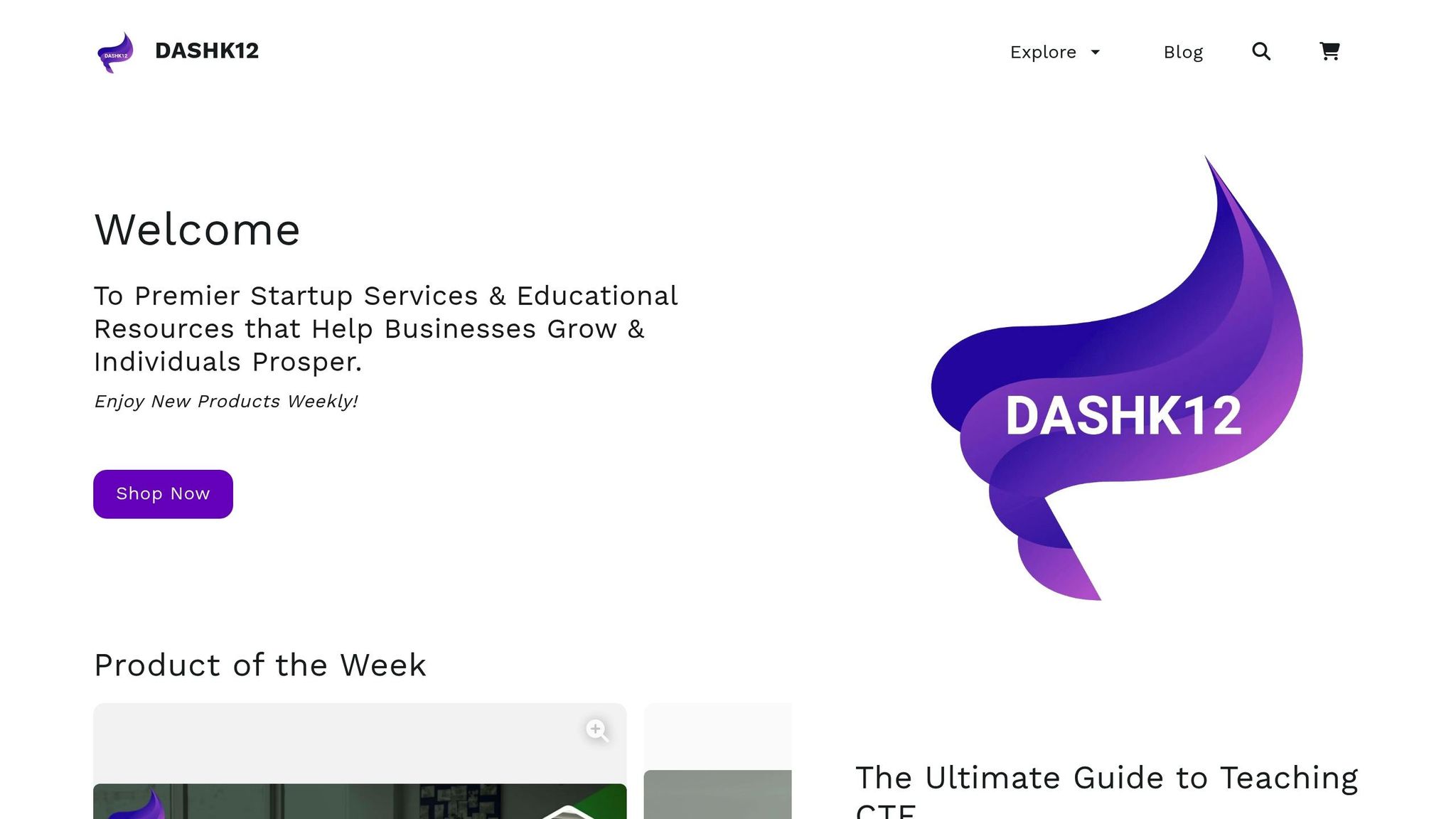Top 7 Online Courses For Business Fundamentals
If you're looking to strengthen your understanding of business basics, here are seven online courses that stand out for their content, flexibility, and career benefits. These courses cover critical areas such as management, marketing, finance, and entrepreneurship. Whether you're aiming to start a business, switch careers, or climb the corporate ladder, these programs can help you build the skills you need.
Key Highlights:
- Wharton Business Foundations Certificate ($79/month): A self-paced program covering essential business concepts like finance, marketing, and operations. Takes 4–6 months to complete.
- Harvard Business School Online CORe ($2,650): A structured 10–12 week course focusing on business analytics, economics, and accounting. Offers a prestigious certification.
- IE Business School Business Essentials MasterTrack ($2,000–$3,000): Combines financial accounting, marketing, and strategy with hands-on projects over 4–5 months.
- UC Irvine Introduction to Business ($49/month): A beginner-friendly course offering a broad overview of business topics in 6–8 weeks.
- Michigan State University How to Start Your Own Business ($39–$79/month): A focused program for aspiring entrepreneurs, covering business planning and launching.
- DashK12 Business Consulting Courses ($100/session): Offers practical learning and consulting sessions tailored to immediate workplace applications.
- University of Virginia Financial Accounting Fundamentals ($39–$79/month): A short, 1-week course diving into accounting basics with hands-on exercises.
Quick Comparison:
| Course | Provider | Duration | Cost (USD) | Focus Areas | Certification |
|---|---|---|---|---|---|
| Wharton Business Foundations | Wharton Online | 4–6 months | $537.30 | Finance, marketing, operations | Yes |
| CORe | Harvard Business School | 10–12 weeks | $2,650 | Analytics, economics, accounting | Yes |
| Business Essentials MasterTrack | IE Business School | 4–5 months | $2,000–$3,000 | Accounting, marketing, strategy | Yes |
| Introduction to Business | UC Irvine (Coursera) | 6–8 weeks | $49/month | General business overview | Yes |
| How to Start Your Own Business | Michigan State University | 4–6 weeks | $39–$79/month | Entrepreneurship | Yes |
| Business Consulting Courses | DashK12 | Flexible | $100/session | Consulting, job skills | No |
| Financial Accounting Fundamentals | University of Virginia (Coursera) | 1 week (13 hours) | $39–$79/month | Accounting basics | Yes |
Each course is tailored to different career goals and learning preferences. Paid programs often deliver better career outcomes, with certifications from institutions like Harvard and Wharton carrying significant weight. Depending on your goals, choose a course that fits your schedule, budget, and career aspirations.
15 incredible FREE courses to learn business | Head start your MBA journey
1. Business Foundations Certificate Program – Wharton Online
The Wharton Business Foundations Specialization provides a thorough introduction to essential business concepts, designed specifically for busy professionals and aspiring entrepreneurs. This fully online program allows learners to build foundational skills without disrupting their schedules.
Flexible, Self-Paced Learning
One of the program's standout features is its flexibility. With 24/7 access available across multiple devices, you can learn whenever and wherever it suits you. The program is structured to be completed in less than seven months, requiring less than two hours of study per week.
Certification and Cost
Completing the course earns you a certificate from Wharton, a credential that can enhance your professional profile. The cost is $79 per month, and you only pay for the time it takes you to finish the coursework.
What Learners Are Saying
With an impressive 4.7/5 rating on Coursera, participants frequently highlight the program's practical content and adaptable format. It’s an excellent starting point for anyone looking to strengthen their business acumen.
Looking for another top-tier option? Check out Harvard Business School Online's CORe program next.
2. CORe (Credential of Readiness) – Harvard Business School Online

Harvard Business School's CORe program offers a deep dive into essential business fundamentals, all in a fully online format. Priced at $2,650, it delivers the prestige of Harvard's business education to learners worldwide.
Course Curriculum: Building Business Expertise
The CORe program is built around three key courses: Business Analytics, Economics for Managers, and Financial Accounting. Each course is led by Harvard Business School professors, ensuring top-tier instruction.
- Financial Accounting: This course lays the groundwork for understanding accounting principles, helping you communicate effectively in the business world.
-
Economics for Managers: Taught by Professor Bharat Anand, this course equips you to apply economic concepts to tackle business challenges. As Professor Anand puts it:
"Economics for Managers is a course that we hope will give you much more confidence and a lot more fun in applying some deep economic principles to fascinating problems in business and management."
- Business Analytics: Guided by Professor Jan Hammond, this course emphasizes the importance of data literacy, a skill that has become indispensable in today's data-driven environment.
Flexible, Self-Paced Learning Options
The program offers self-paced cohorts with durations of 10, 12, or 17 weeks, allowing you to choose a schedule that fits your life while still adhering to structured deadlines.
A Credential That Boosts Careers
Completing all three courses and a final exam earns you the Credential of Readiness from Harvard Business School Online. This certification not only highlights your dedication to professional growth but also serves as excellent preparation for MBA programs. Impressively, 94% of participants reported a stronger grasp of business terminology after finishing the program. It’s a great stepping stone for those looking to advance their education or career, as we’ll see in the next course.
3. Business Essentials MasterTrack Certificate – IE Business School

The Business Essentials MasterTrack Certificate from IE Business School introduces key management skills through a flexible online format. This program combines in-depth content with an adaptable structure, making it accessible for busy professionals.
Core Curriculum: Building a Strong Business Foundation
The program is divided into four main courses, each focusing on critical business areas:
- Financial Accounting and Reporting: Learn how accounting serves as a vital information system. This course dives into analyzing how economic events influence financial statements.
- Marketing Management: Cover essential marketing concepts like segmentation, targeting, and positioning. You'll also explore the marketing mix - product, price, promotion, and place - while addressing social and environmental considerations.
- Foundations of Strategy: Hone your strategic thinking by structuring business missions, exploring general management challenges, and using tools like Porter's 5 Forces to evaluate competitive landscapes.
- Skills Portfolio and Capstone Project: Develop hands-on skills in areas such as agile methodologies, visual design, and design thinking. The capstone project lets you tackle a real-world case study, applying theoretical knowledge to practical scenarios.
Flexible Learning: A Blend of Self-Paced and Live Sessions
The program offers a mix of self-paced and live online learning to replicate the on-campus experience at IE Business School. Each course includes two live-online sessions, where you'll collaborate with peers from around the world, sharpening both your business acumen and teamwork abilities. With IE's Lifelong Learning Certificates, you can complete the program on your own schedule.
Certification for Career Growth
Upon finishing the program, you'll earn a certificate from IE Business School, which can enhance your resume and may even count toward a Master's degree. This program is carefully designed to equip you with practical skills and knowledge that are directly applicable in the workplace.
"The program embodies this focus on real-world insight, teaching practical skills to address the challenges faced by professionals. You will gain critical knowledge and marketable skills that will lay the foundation for new career opportunities." – Steve S., Construction Engineering & Management MasterTrack Certificate
4. Introduction to Business – University of California, Irvine (Coursera)
The Introduction to Business Specialization, offered by the University of California, Irvine through Coursera, is tailored for learners with packed schedules. Here's how the course structure makes it easy to fit learning into your life.
Flexible, Self-Paced Learning
This course follows Coursera's signature format, where most modules are self-paced and come with adjustable deadlines. This means you can move through the material at your own speed. The program is designed to be completed in about 4 weeks, with a recommended time investment of 10 hours per week.
sbb-itb-4f1eab7
5. How to Start Your Own Business – Michigan State University

Michigan State University's "How to Start Your Own Business" specialization provides a clear roadmap for aspiring entrepreneurs. From shaping your mindset to launching your venture, this program walks you through every step of the process.
Course Curriculum: Building Your Business from the Ground Up
The program is divided into six sequential courses, each focusing on an essential aspect of starting a business:
- Developing an Entrepreneurial Mindset: Learn to shift your perspective and cultivate the traits that drive entrepreneurial success.
- The Search for Great Ideas: Master tools and techniques for generating ideas and identifying the most promising opportunities.
- Planning: Develop a realistic business model and create accurate financial projections.
- Structure: Dive into financial documentation, regulatory requirements, intellectual property basics, and team-building strategies.
- Launch Strategy: Explore the key actions and decisions needed to prepare for your business's debut.
- Capstone – Launch Your Own Business!: Put your skills to the test with a hands-on project that helps you bring your business idea to life.
This program equips you with practical skills in business modeling, financial analysis, and marketing strategy to set you up for success.
Flexible Learning Options to Suit Your Schedule
The courses are available in online and blended formats, offering flexibility for learners with different needs. Most of the curriculum is self-paced, allowing you to progress at your own rhythm. For those looking for a more interactive experience, teams or study groups can schedule live training sessions through MSU Extension.
Certification to Boost Your Career
After completing the specialization, you'll earn a certificate from MSU's Eli Broad College of Business. This credential not only validates your entrepreneurial expertise but also enhances your professional profile, making you more competitive in the U.S. job market.
6. Business Consulting and Self-Paced Courses – DashK12

DashK12 blends education with practical business services, offering consulting and self-paced courses designed to bridge the gap between theory and real-world application. Their approach combines academic learning with hands-on experience, creating opportunities for learners to build both knowledge and practical skills.
Covering Key Business Topics
DashK12's courses focus on essential business areas like consulting strategies, job interview preparation, and career and technical education (CTE) resources. Their curriculum is packed with practical tools, including e-books, slide decks, and digital resources, all aimed at helping learners master the core aspects of business operations and consulting practices. By combining academic content with real-world business scenarios, DashK12 provides learners with a firsthand understanding of what consulting looks like in action.
Learn at Your Own Pace
DashK12's self-paced learning format is designed with flexibility in mind. Learners gain lifetime access to a wealth of materials, including e-books, slide presentations, and resource packages. This format allows busy professionals to learn on their own schedules and revisit the content whenever they need to, making it easy to adapt learning to their career growth.
Focus on Practical Skills Over Certifications
Rather than emphasizing formal certifications, DashK12 prioritizes equipping learners with skills they can immediately apply in the workplace. By combining hands-on consulting experience with carefully curated learning materials, the platform ensures that participants build competencies that are directly relevant to their professional goals.
Tailored to U.S. Business Standards
DashK12's offerings align with the needs of the U.S. job market, providing flexible, applied learning tailored to industry demands. For instance, their job interview and consulting sessions, available at $100 for a 2-hour session, reflect market expectations while catering to both individual learners and educational institutions. This approach supports the development of essential business skills and meets the growing demand for career and technical education across the United States.
7. Financial Accounting Fundamentals – University of Virginia (Coursera)

The University of Virginia offers a Financial Accounting Fundamentals course on Coursera, designed to teach essential accounting principles. Led by instructor Luann J. Lynch, this course has garnered an impressive 4.8 out of 5 stars from 2,787 reviews, with 98% of participants expressing satisfaction with their learning experience.
Course Curriculum: Building a Strong Foundation
This course dives into the core financial statements - Balance Sheet, Income Statement, and Statement of Cash Flows - and walks learners through recording business transactions using journal entries and organizing them with t-accounts.
What sets this course apart is its hands-on approach. Students engage with The Garden Spot, a fictional startup, to see how accounting principles translate into real-world scenarios. Additionally, an analysis of PepsiCo's Annual Report provides a glimpse into financial reporting practices of major U.S. corporations. The curriculum unfolds over five modules:
- Introduction to Financial Accounting and the Balance Sheet
- Recording Transactions
- The Income Statement and Revenue/Expense Transactions
- The Statement of Cash Flows
- Financial Statement Analysis with an Annual Report review
These modules are structured sequentially to ensure a comprehensive learning experience.
Flexible Learning for Busy Schedules
Designed to fit around demanding schedules, this online course offers a self-paced format with flexible deadlines. With approximately 13 hours of video content, learners can complete the course in about one week by dedicating 10 hours [22, 28]. Short, focused videos paired with interactive exercises make complex accounting concepts easier to grasp.
Career Advancement with Certification
Upon finishing the course, learners earn a certificate, adding value to their resumes and career development efforts. As part of the Entrepreneurship: Growing Your Business Specialization, this course is particularly beneficial for aspiring entrepreneurs or those looking to grow in entrepreneurial roles. No prior accounting knowledge is required, making it accessible to beginners [22, 25].
Tailored to U.S. Business Practices
The course content is aligned with U.S. accounting standards, making it especially relevant for those working in or planning to enter the U.S. business environment. By analyzing PepsiCo's financial reports, learners gain practical insights into corporate financial reporting practices in the United States.
Course Comparison Table
When deciding on a course, it's essential to align your choice with your goals, budget, and schedule. The table below breaks down the key differences to help you make an informed decision.
| Course | Provider | Core Topics | Duration | Format | Price (USD) | Certificate | Key Features |
|---|---|---|---|---|---|---|---|
| Business Foundations Certificate | Wharton Online | Operations management, finance, marketing strategies, human capital, corporate finance | 4–6 months | Self-paced | $537.30 | Yes | Free audit option; Ivy League credibility |
| CORe (Credential of Readiness) | Harvard Business School Online | Business analytics, economics for managers, financial accounting | 10–12 weeks | Structured online | $2,650 | Yes | Real-world case studies; active learning approach |
| Business Essentials MasterTrack Certificate | IE Business School | Financial accounting, marketing management, strategy foundations, skills portfolio | 4–5 months | Self-paced | $2,000–$3,000 | Yes | European business perspective; portfolio development |
| Introduction to Business | UC Irvine (Coursera) | Search engine marketing, financial statements, business planning, strategic planning, digital marketing, leadership and management | 6–8 weeks | Self-paced | $49/month | Yes | Beginner-friendly; broad business overview |
| How to Start Your Own Business | Michigan State University | Mindset, creativity and innovation, business planning, building systems for growth | 4–6 weeks | Self-paced | $39–$79/month | Yes | Entrepreneurship focus; practical startup guidance |
| Business Consulting & Self-Paced Courses | DashK12 | Customized business consulting, job interview training, practical skills | Flexible | Self-paced | $100 per session | Varies | Personalized approach; lifetime access to materials |
| Financial Accounting Fundamentals | University of Virginia (Coursera) | Income statements, balance sheets, cash flows, financial analysis | 1 week (13 hours) | Self-paced | $39–$79/month | Yes | Hands-on practice |
Price Considerations
Course prices vary significantly, ranging from $39 per month to $2,650. Wharton's Business Foundations Certificate stands out with a price of $537.30, offering a free audit option for those looking to explore before committing.
Duration Flexibility
If time is a critical factor, options like the University of Virginia's Financial Accounting Fundamentals course can be completed in just 1 week, while Harvard's CORe program offers a more immersive 10–12-week experience. For a longer, in-depth study, Wharton's program spans 4–6 months.
Learning Approach
Each course offers a unique style of learning. Harvard employs a case-based, interactive format to simulate real-world scenarios, while DashK12 focuses on personalized consulting sessions, priced at $100 for two hours, tailored to individual needs.
Certificate Value
The value of the certificates varies across providers. Credentials from institutions like Harvard and Wharton carry notable prestige, while Coursera certificates from UC Irvine and the University of Virginia are highly regarded in professional settings. DashK12, on the other hand, emphasizes skill-building over formal certification, making it ideal for those focused on practical outcomes.
Conclusion
Choosing the right business fundamentals course hinges on three main factors: your career goals, preferred learning style, and budget. As outlined earlier, each program caters to distinct career ambitions. According to data, 64% of employers favor candidates with paid, certified training over those who complete free courses.
Paid courses stand out with substantially higher completion rates (85% vs. 3–6%) and placement rates (78% vs. 23%). They also deliver greater career benefits, including an average salary increase of $11,050 compared to $4,160 for free courses. For those prioritizing career advancement, these figures make a compelling case for investing in paid education.
Credentials from prestigious institutions carry significant weight in the U.S. job market. Harvard Business School Online and Wharton certifications are highly respected, while Coursera certificates from UC Irvine and the University of Virginia are also widely recognized. DashK12 takes a different approach, offering personalized consulting sessions for $100 per two-hour session, focusing on practical skills without requiring formal certification.
Your learning preferences also play a key role. Harvard's case-based approach may resonate with analytical thinkers, while Wharton’s self-paced program suits busy professionals. On the other hand, DashK12’s one-on-one consulting provides tailored guidance for those seeking a more personalized experience. Each option - from Harvard's structured cases to DashK12’s flexible consulting - aligns with different professional needs.
"Your business education is only as strong as the effort you put into it", says Catherine Cote, Marketing Coordinator at Harvard Business School Online.
If you’re just starting to explore business concepts, free courses offer a low-risk introduction. However, for meaningful career development, paid programs deliver significantly better outcomes, with 89% of participants reporting direct career benefits compared to 45% from free courses.
When deciding, consider how quickly you want to achieve your career goals. Match the program’s duration, format, and focus areas with your objectives and lifestyle. Use this analysis as a roadmap to select the course that best fits your professional aspirations.
FAQs
How do I decide between a short-term course and a longer program for learning business fundamentals?
When choosing between a short-term course and a longer program, it's important to weigh your goals and priorities. Short-term courses are ideal if you need to quickly acquire specific skills or tackle an immediate challenge. On the other hand, longer programs provide a more comprehensive dive into business fundamentals, giving you the tools to build a solid foundation for long-term growth.
Think about factors like your current level of experience, how much time you can commit, and the complexity of the topics you're aiming to learn. If your focus is on gaining targeted knowledge in a short amount of time, a short course might be the way to go. But if you’re aiming to deepen your understanding and develop strategic thinking, an in-depth program could be the smarter choice.
How can certifications from online business courses boost my career and job prospects?
Earning certifications through online business courses can significantly boost your career potential by highlighting your expertise and dedication to advancing professionally. These credentials serve as tangible proof of your abilities in specific business disciplines, helping you stand out in a competitive job market. In the U.S., employers often see certifications as evidence of specialized skills, which can open doors to better job opportunities, promotions, and even higher pay.
Certifications also signal to employers that you're committed to continuous learning and staying current in your field. This proactive approach can be particularly valuable when pursuing leadership positions or negotiating a salary increase, as it underscores your focus on both personal and professional growth.
How do these courses differ in their teaching methods, and how can they meet various learning styles and career goals?
These courses offer a range of teaching styles to suit different learning preferences and career goals. Some are designed with self-paced modules and flexible schedules, perfect for those who prefer to learn independently or need to fit studying into a busy lifestyle. Others emphasize interactive, hands-on learning, incorporating activities that appeal to kinesthetic learners who excel through practical experience.
To meet a variety of needs, many courses blend visual, auditory, and interactive tools like videos, quizzes, and collaborative projects. This mix allows learners to tailor their experience to their preferred style while working toward objectives that might include mastering leadership skills or gaining technical expertise. The diverse teaching methods ensure these courses are accessible and beneficial for professionals at any stage of their career journey.